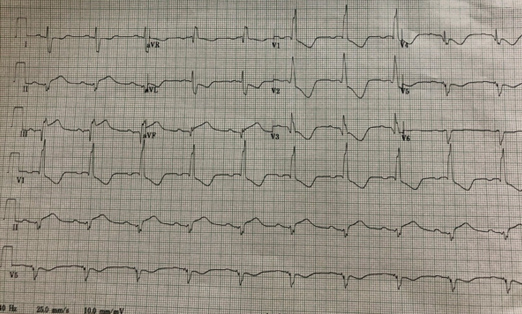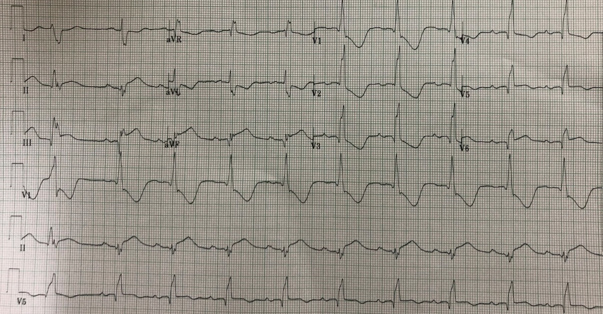Dizziness in an Elderly Lady
79 year old female with CAD s/p stents in 2013, HTN, COPD is brought in by the family for dizziness x 1 day. No chest pain, no shortness of breath, no nausea or vomiting. Patient had no neurologic complaints. On physical exam, patient appeared fatigued, but was alert and oriented x3. Her vital signs were stable. Lungs were clear to auscultation without wheezing, rhonchi or crackles. Cardiovascular exam was also within normal limits. Neurologic exam was non-focal.
Her ECG:

Right-sided ECG is as follows:

STEMI alerts has been activated and patient went to cath lab.
The angiogram shows a 100% RCA occlusion:
Case discussion and teaching points:
- This patient presented with dizziness only. Beware that older patients and females may have an atypical presentation, as demonstrated by this case. You must have a high index of suspicion for all the critical diagnoses that we are all taught about, notably cardiovascular emergencies.
- The initial ECG showed ST segment elevations in inferior leads, which corresponds to an RCA occlusion. There are also reciprocal ST segment depressions in precordial (V1 – V4) and lateral (I, aVL) leads, which further proves the presence of an acute myocardial infarction. Remember, that inferior leads give you information about RCA, while the other leads show you what is happening with LAD.
- Since statistically, about 30-50% of inferior wall Mis have a concomitant RV involvement, it is prudent to obtain a right-sided ECG to exclude the presence of RV infarct. You would be looking for ST segment elevation in a lead RV4. If there is an RV infarct, the use of Nitroglycerin is contraindicated, as its administration will promptly drop the blood pressure. These patients are preload-dependent and will need IV fluids.
Courtesy of Karima Sajadi
Keywords: dizziness, inferior wall myocardial infarction, right-sided ECG, RCA occlusion
Contact Information
Karima Sajadi-Ernazarova, MD
Associate Professor of Emergency Medicine
215.762.2374 | karimasajadi@gmail.com
The information on these pages is provided for general information only and should not be used for diagnosis or treatment, or as a substitute for consultation with a physician or health care professional. If you have specific questions or concerns about your health, you should consult your health care professional.
The images being used are for illustrative purposes only; any person depicted is a model.
Back to Top